Financially, things are messy for Rec and Park right now. It’s facing a budget deficit of $16.5 million over the next two years and is proposing controversial measures like charging for parking and tennis courts to raise revenue. Its most important private supporter — the San Francisco Parks Alliance — is shutting down amidst allegations of longtime financial mismanagement.
It’s hard to know what these developments will mean for the park. Financial messes are hard to clean up. So let’s talk about physical messes instead, which are much simpler to deal with and what this post is really about.
Thousands of tons of trash are illegally dumped every year in San Francisco and, sadly, the park is a prime dumping spot for stuff people are too cheap or poor or lazy or negligent to dispose of properly.
But it doesn’t stay there long, and for that, please thank the environmental services crew, the three-person team who rove around the park in search of junk and remove it. “We address eyesores,” is how the crew’s supervisor, Vincent Webster describes the team’s job. That’s a category that includes dumped debris, abandoned encampments, litter, graffiti and the occasional downed tree. They also help clean up after big events like Outside Lands, Hardly Strictly Bluegrass or Bay to Breakers.
I spent a morning with Webster recently. It was 8:30 when I got to his office (sandwiched between the bathrooms in a building south of the Polo Field.) At 62, he’s tall, thin. with a graying beard, a brilliant smile and an unshakably cheerful demeanor. He handles what I can only think of as a Sisyphean job with inspiring good humor and grace.
By then he’d already been on the job for more than two hours. He likes to start early before the gardeners or the rest of his crew get to work. He’ll circle the park perimeter from the Panhandle to the Great Highway, drive down the stretch now called Sunset Dunes, loop Lake Merced and then head back to his office. After just that one trip the back of his pickup was already nearly full with debris, including the remnants of a refrigerator he found in the bushes near 47th Ave. and Lincoln.
We climbed into the truck and he steered it along a dirt path, constantly scanning to the left and right. “I look for colors that aren’t natural,” he explains. By now he’s developed an eye for eyesores, a sixth sense for what doesn’t belong.
“People dispose of any and everything,” he says. Paint and oil cans, propane tanks, car batteries,,office equipment, furniture, clothing, remnants from house renovations, washing machines, take-out containers, clutches of trash bags, toaster ovens, bicycles, even motorcycles and cars. One time he found a full-sized power boat in Spreckels Lake. (For that, like other vehicles, he calls in the police.)
Whatever he and his crew collect is hauled to the maintenance yard, where it’s sorted for proper disposal. It was depressing to see all the crap people toss in the park. We humans are so prone to laying waste.
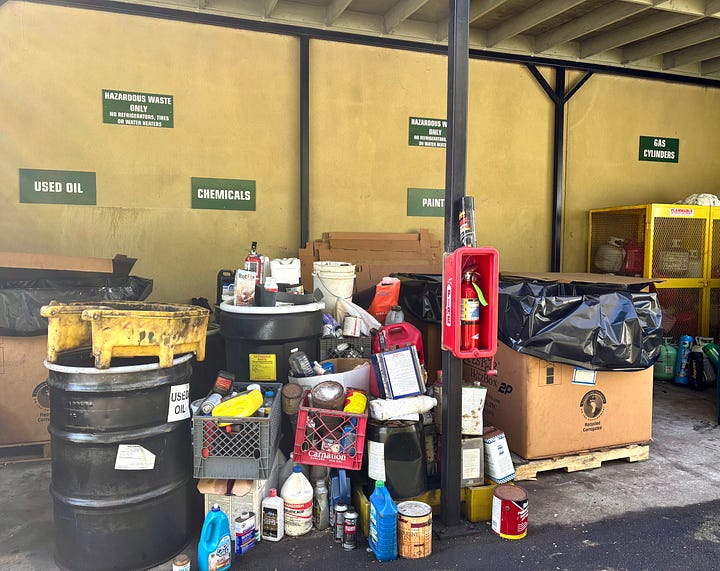
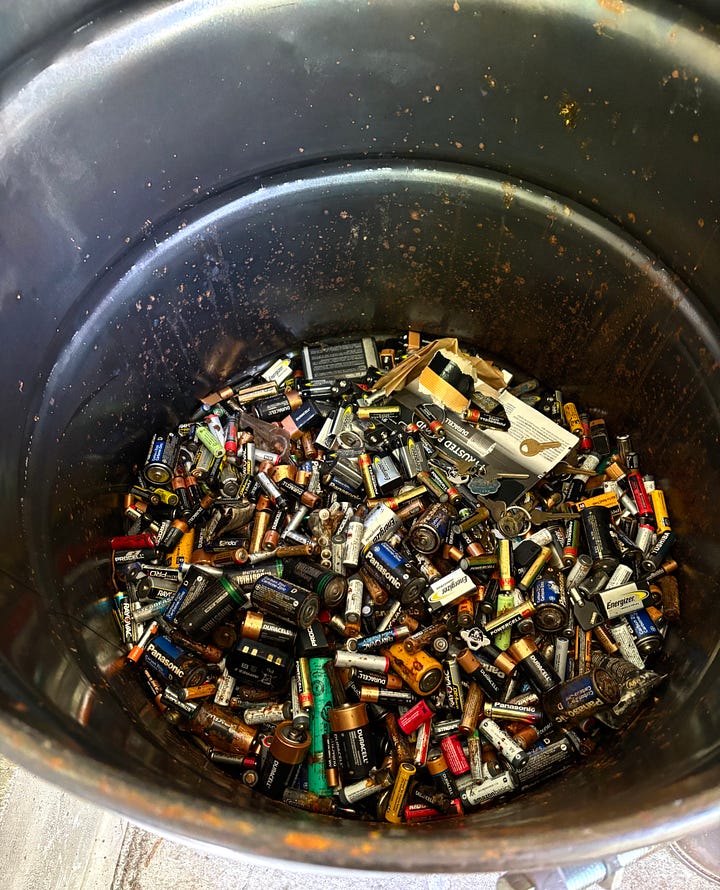
Webster rarely discovers anything of value, though he did once find a $50 bill. “I turned it in to the park rangers and then I left one of the flags that we have showing that property was removed from this location. I didn't say what it was. I just let them know if you want to retrieve it, this is where you can go back to find it.”
For the most part he doesn’t bother with little bits of litter. “I’m not going to stop a one-ton truck for a piece of paper,” he says. But as we turn off JFK Promenade onto Nancy Pelosi Drive, he notices a small bottle of whiskey and a pack of cigarettes on a bench. “Now this, I'll stop and get. That's not what I would want someone's kid to come into our park and see.”
When they find graffiti, they’ll power wash it off, if thats possible. He leaves it to the gardeners to deal with trees that have been graffitied.
Growing up in the Silver Terrace district, Webster occasionally visited the park. He knows it better now and appreciates the nature in it more than he ever did as a child. He feels protective of the place. “This is one of the most beautiful parks in the world. I love this park.”
We head west along narrow dirt trails I can’t believe he can navigate. He pulls over by a graffiti-splattered metal container that is meant to hold gardeners’ tools. The top has been pried open and the hinges are broken and the tools are long gone. Now it’s being used as a trash can where people have left a broken umbrella, a broom stick, an old printer, food wrappers and dozens of dog poop bags. Webster slips on gloves and uses his industrial grade grabbers to pick up the small items and place them in a trash bag.
As he is carrying the printer back to the truck, he spots something ahead in the bushes – the remnants of a campsite tucked under arching tea trees. He gets out another two trash bags and walks around it picking up a dirt-covered blanket, Big Gulp cups, bottle caps, and a bottle filled with urine. He’s quick and efficient and seemingly unfazed as he clears the site of every last bit of trash.
Do you ever get really grossed out? I ask as we get back into the truck.
“Yes, but that's when you have to just take that deep breath and say, if I leave it here, it's gonna be worse for the park,” he says. “I mean, no one's gonna like picking up bags of dog poop or bottles of human waste, right? But on the other side, you think about what it looked like when we walked in versus what it looked like when we left, that's what I want to leave. I want to give everyone else the opportunity to see it the way we left it, not the way we approached it.”
We drive a little further. Through the bushes he spies the pale white edge of a mattress and a man sitting on the ground next to it. An inevitable part of his job is interacting with unhoused people living in the park.
“Hello, how are you today sir?” he says approaching the man.
“Very good,” the man replies. Webster introduces himself and asks the man’s name. It’s Michael.
“Is that your mattress?
Michael says it’s not; he found it there.
“I have to remove it. I apologize for the inconvenience,” Webster says.
Michael offers to help him haul it out, but Webster declines: “I have to do it myself.”
But first he takes a few minutes to chat with Michael, asking several times if he needs any help with housing, clothing or whatever. If Michael did want help, Webster could alert the park rangers who work with homeless people or the city’s Homeless Outreach Team. But Michael isn’t interested.
“I'm in this park every day. My name is Vincent. I'm one of the supervisors here. If you need any assistance or help, anything, can I count on you to look for me and call out?”
“Okay,” Michael says.
“Okay thank you,” Webster replies and then explains again that he has to take the mattress because “household furnishing is not allowed in the park.”
“Oh, I know that,” Michael says. “I was born in the city. I like things clean. Too many people drag the stuff in and they don’t drag it out.”
As we trundle along in search of trash, Webster reminds me that there are two other trucks prowling the park doing the same thing. By day’s end, he estimates each of them will probably pull out a truckload and a half of trash. “That’s like four and a half truckloads every day. That’s a lot. That’s horrible! That's almost saying we don't care about our parks, we don't appreciate, we don't respect our parks.”
Yet when I ask Webster if having to clean up people’s messes all day long makes him at all cynical about human nature, he insists no.
“It makes me feel like I've done a good job and I made sure that the park is presentable and safe,” he says. “I try to look at things in a positive manner at all times. You know? I mean, if we take it in that cynical direction, it's gonna keep you on a downbeat. So I just like to look at the positives of it. I did something good today. The park is gonna be that much safer and presentable to the public. And you know, that way everyone can continue on with a smile.’

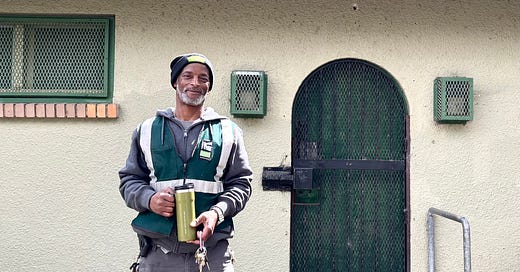



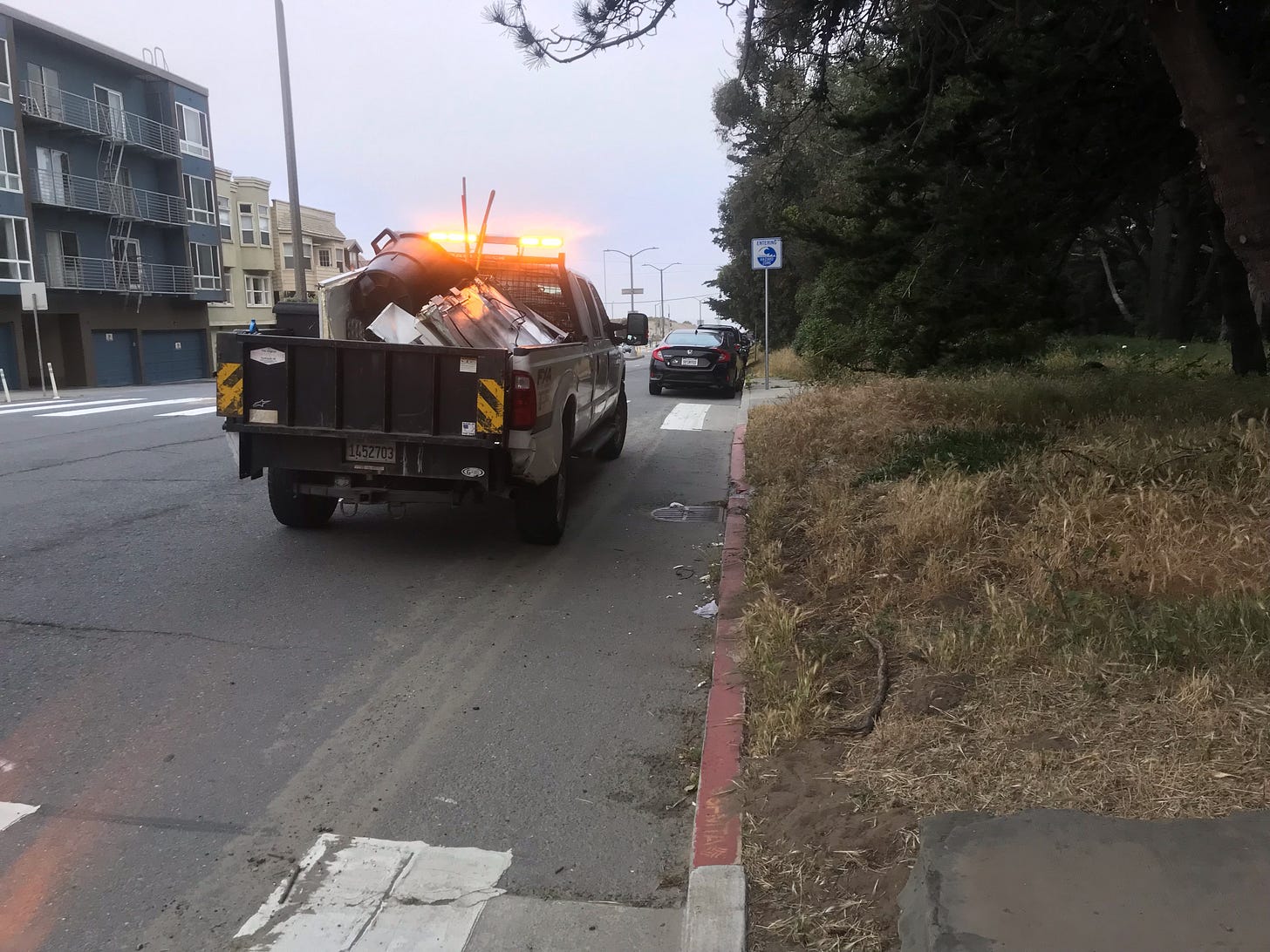
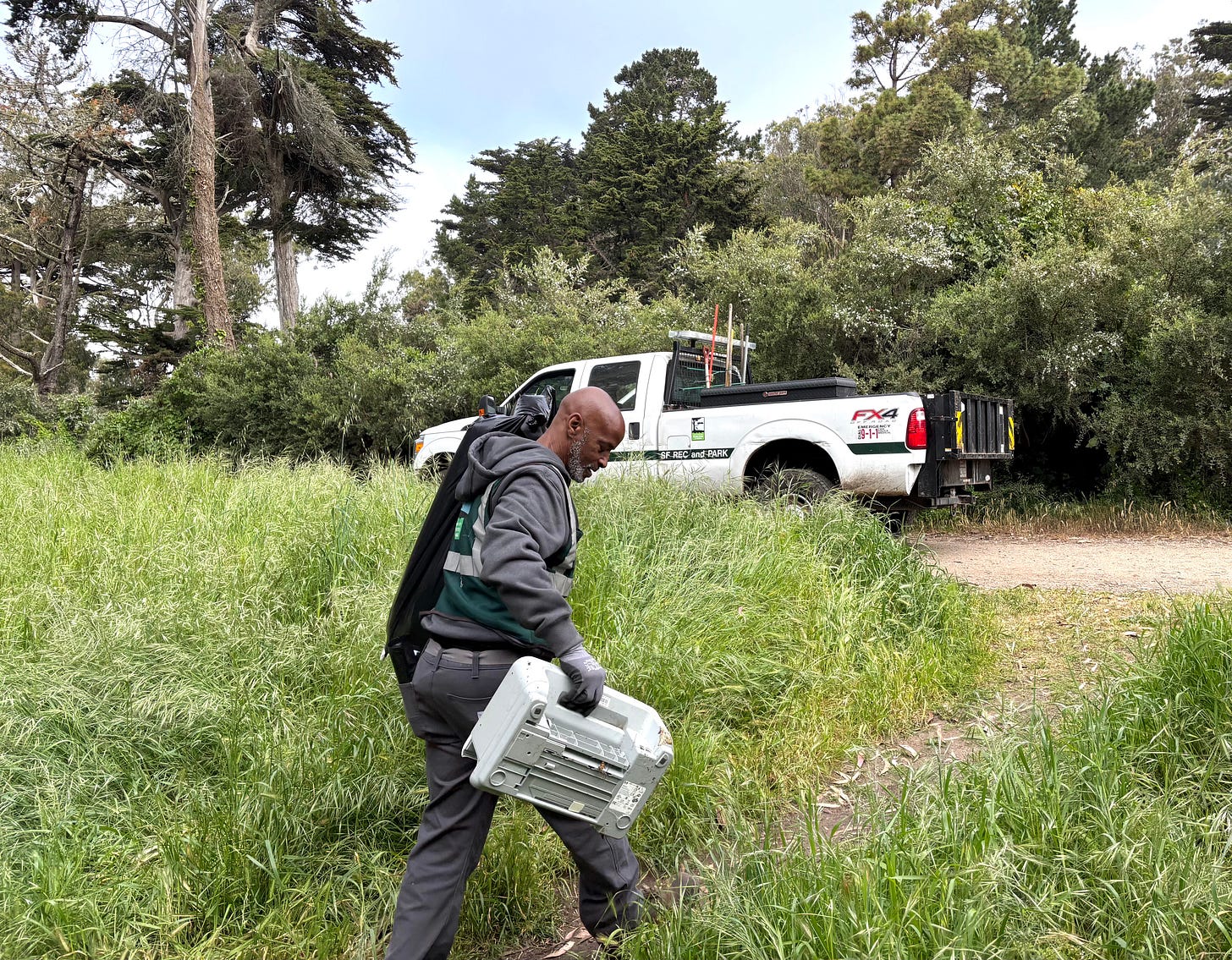
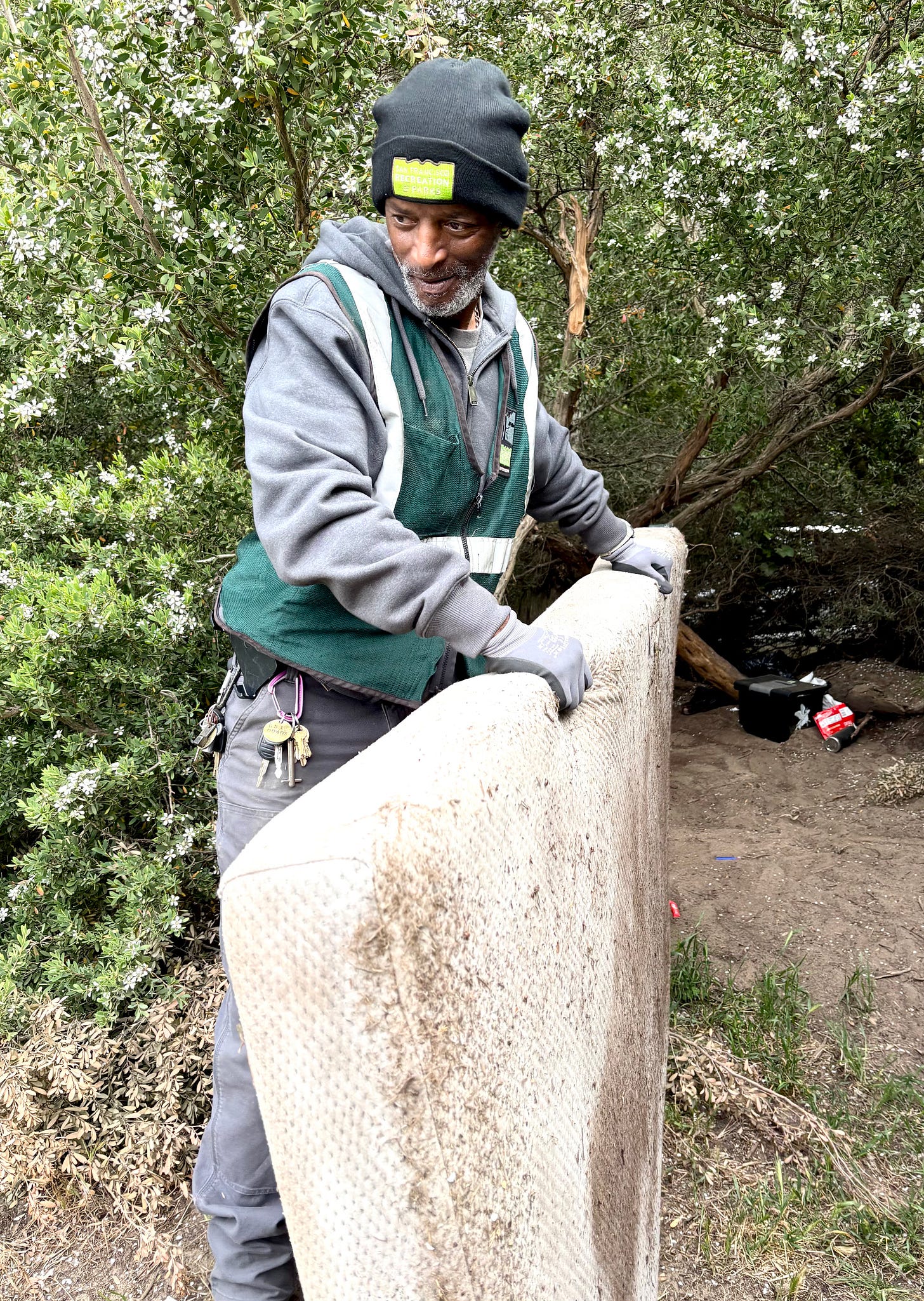
Michael is like the park parent picking up the house and getting ready for the company that’s coming over that day. He does it with such grace and kindness. What a beautiful soul.